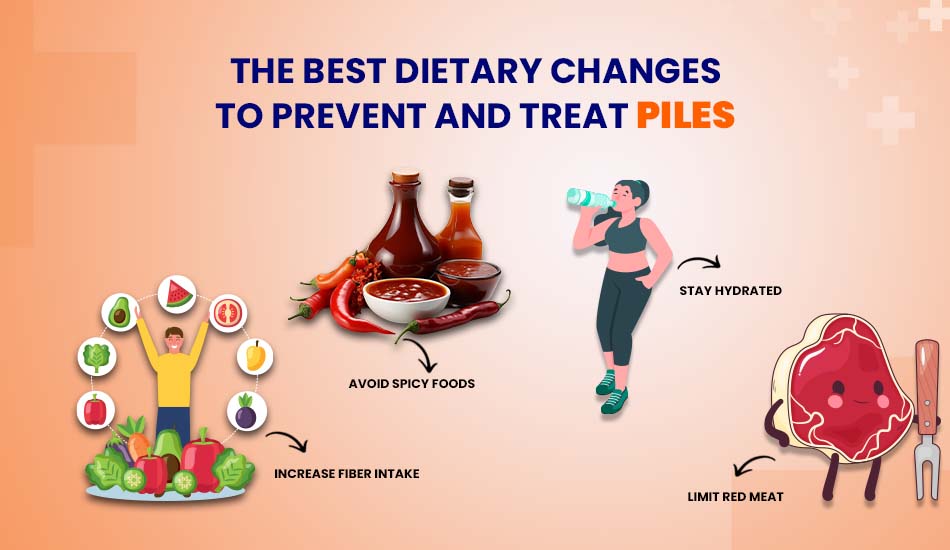
The Best Dietary Changes to Prevent and Treat Piles
Wednesday, 5th June 2024Piles, or hemorrhoids, can be a painful and uncomfortable condition. However, making certain dietary changes can help prevent their occurrence and manage symptoms if you already have them. Here are the best dietary changes to consider to keep piles at bay and to find relief.
1. Increase Fiber Intake
One of the most effective ways to prevent and treat piles is by increasing your fiber intake. Fiber helps soften stool and promotes regular bowel movements, reducing the strain on your rectal veins.
- Fruits: Apples, bananas, oranges, and berries.
- Vegetables: Broccoli, carrots, peas, and leafy greens.
- Whole Grains: Oats, brown rice, quinoa, and whole wheat bread.
- Legumes: Beans, lentils, and chickpeas.
2. Stay Hydrated
Drinking plenty of water is essential for maintaining soft stools and preventing constipation. Aim for at least 8-10 glasses of water a day. Staying hydrated helps your digestive system function smoothly and reduces the likelihood of developing piles.
3. Avoid Processed Foods
Processed foods often lack fiber and can lead to constipation, making piles more likely. Reduce your intake of:
- Fast Food: Burgers, fries, and fried chicken.
- Snack Foods: Chips, cookies, and candy.
- Pre-packaged Meals: Frozen dinners and instant noodles.
4. Limit Red Meat
Red meat can be difficult to digest and may contribute to constipation. Instead, opt for lean proteins that are easier on your digestive system, such as:
- Poultry: Chicken and turkey.
- Fish: Salmon, tuna, and mackerel.
- Plant-Based Proteins: Tofu, tempeh, and legumes.
5. Incorporate Healthy Fats
Healthy fats can aid digestion and help prevent constipation. Include sources of healthy fats in your diet, such as:
- Avocados
- Nuts and Seeds: Almonds, walnuts, chia seeds, and flaxseeds.
- Olive Oil and Coconut Oil
6. Eat Smaller, More Frequent Meals
Eating large meals can put extra pressure on your digestive system. Instead, try eating smaller, more frequent meals throughout the day. This can help keep your digestive system moving and reduce the risk of constipation.
7. Avoid Spicy Foods
Spicy foods can irritate the digestive tract and worsen the symptoms of piles. If you are prone to piles, it may be helpful to limit your intake of spicy foods like:
- Chili Peppers
- Hot Sauce
- Spicy Curries
8. Reduce Caffeine and Alcohol
Caffeine and alcohol can dehydrate your body, leading to constipation. Limiting your intake of coffee, tea, and alcoholic beverages can help keep your digestive system healthy and reduce the risk of piles.
9. Eat Probiotic-Rich Foods
Probiotics promote a healthy gut flora, which is essential for good digestion. Include probiotic-rich foods in your diet, such as:
- Yogurt
- Kefir
- Sauerkraut
- Kimchi
- Miso
10. Monitor Your Eating Habits
Pay attention to how your body responds to different foods. Keeping a food diary can help you identify any foods that may trigger or worsen your piles symptoms. Adjust your diet accordingly to maintain good digestive health.
Why Choose Shriram Hospital for Piles Treatment?
At Shriram Hospital, we understand that managing piles involves a holistic approach, including dietary changes. Our team of specialists provides comprehensive care and guidance to help you make the best choices for your health.
Conclusion
Making the right dietary changes can significantly impact the prevention and treatment of piles. By incorporating more fiber, staying hydrated, and avoiding certain trigger foods, you can manage your symptoms effectively. For expert advice and treatment, reach out to the specialists at Shriram Hospital.


